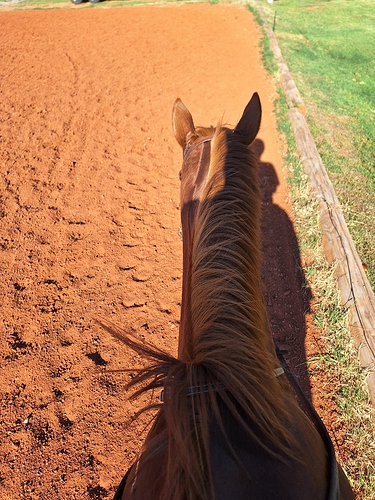I have had my OTTB mare for 6 years, she is now 11. We have done a decent amount but I had several years of grad school/career changes in there so there was a few years we didn’t get out much. She is a sensitive chestnut TB mare, hate the stereotype but it’s the easiest way to describe her.
She is not “green” in the typical sense. Obviously we can always improve but her flat work is solid, jump courses with changes, ditches, banks, water, etc.
But our last hurdle is definitely finding some sanity and consistency off property. I have done quite a bit of “trail riding” at a local walking path & she is great at the walk. However, trotting & cantering gets her amped & then I feel like I am riding a powder keg.
Not sure what I am asking here, but I guess just that if I get her out every weekend (schooling shows, trails, etc.) this year should I expect some improvement or are some horses just always unsettled? Several years ago when I was more consistent we definitely had improvement so I think there’s a light at the end of the tunnel but I am in my 30s now and the bravery is just not what it once was.
Any other tips for easing the tension off property?
The happy mare at home:


 but now we have more good days than bad and he seems to get bored of his own tantrums in a shorter time. Maybe when he’ll turn 20 he’ll become a solid citizen, who knows
but now we have more good days than bad and he seems to get bored of his own tantrums in a shorter time. Maybe when he’ll turn 20 he’ll become a solid citizen, who knows . For him, the harder he worked, the better he was. No one hour hack on a loose rein for him. He thrived on 3+ hour trail rides at least once a week, and a strong gallop or two during the week. My trainer had a quarter mile track so that was easy. On trail rides I didn’t gallop much if at all, mainly a long trot (I guess that would be equivalent to a medium trot) and walking in a marching pace. Once he got the hang of it, that all could be done on a long rein. In my 20’s he was the perfect horse!
. For him, the harder he worked, the better he was. No one hour hack on a loose rein for him. He thrived on 3+ hour trail rides at least once a week, and a strong gallop or two during the week. My trainer had a quarter mile track so that was easy. On trail rides I didn’t gallop much if at all, mainly a long trot (I guess that would be equivalent to a medium trot) and walking in a marching pace. Once he got the hang of it, that all could be done on a long rein. In my 20’s he was the perfect horse! It depends if your horse simple needs more work or maybe she’s a horse that will always have an edge.
It depends if your horse simple needs more work or maybe she’s a horse that will always have an edge. is I got Charlie (Fjord) at three and spent the first while riding him bareback on an extensive trail system at the barn we were at while we got saddle fit sorted out. Everyone thought I was nuts! I figured the ground was close enough I could slide off in a pinch if I needed to. Granted it was mainly walking, but I never needed to bail.
is I got Charlie (Fjord) at three and spent the first while riding him bareback on an extensive trail system at the barn we were at while we got saddle fit sorted out. Everyone thought I was nuts! I figured the ground was close enough I could slide off in a pinch if I needed to. Granted it was mainly walking, but I never needed to bail.
